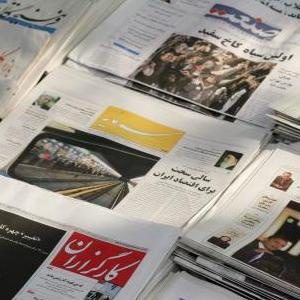Tehran’s Daily Newspaper Review

In defense of the president’s initiative, Iran’s top headline was the news of the pilot project of “Granting 1000 square meters of land to every household”, which is planned to be implemented in 10 cities. The newspaper added that due to the Supreme Leader’s concern about the outcomes of the original project –the “Garden-Cities”-- related studies are frozen and the new project is substantially different. The newspaper also covered the opposition protests in Malaysia with the headline “Massive demonstrations in Malaysia’s capital lead to arrests and deaths of opposition leaders”, while Kuala Lumpur enjoys close relations with Iran. In his meeting with tax functionaries, Ahmadinejad stated, “The government’s determination is to improve the citizens’ living conditions.”
Jomhouri-ye Eslami’s front page was Arab affairs-dominated: “Step by step progress of revolutionaries towards Tripoli” was printed in large font on the front page, while similar headlines read “Demonstrations in Egypt continue with chants calling for trials of Mubarak regime officials”, “Obama: We won’t leave Iraq”, and “National dialogue starts in Syria.” The newspaper also claimed, “Price screening has been abandoned”. It also quoted Ayatollah Hashemi Rafsanjani as saying that “Trusting people is the best way to run the country.”
Kayhan’s top headline reflected the Principlists’ burgeoning worries about a possible split in the parliamentary elections and losing their grip over the legislative body –already threatened by Ahmadinejad and Mashaei reportedly poised to dominate the seats: “Principlists’ consensus mechanism in Kayhan’s exclusive report”. The newspaper has also printed a large photo of the chaotic situation in Yemen with the caption: “Ali Abdullah Saleh’s [presidential] guards’ atrocious assault against the opposition in several cities of Yemen”. The newspaper also covered the July 9th rally in Malaysia, giving it an Islamic flavor with the headline “Malaysia’s Islamic Party [PAS]: We will continue protests until demands are met.” It also reported that efforts to summon the president to Majles for answering questions are officially canceled.
Kamran Baqeri Lankarni, Minister of Health in Ahmadinejad’s first cabinet, was the top headline in Resalat. He was quoted as saying, “The younger generation is the capital of Principlism”. On the anniversary of the kidnapping of four Iranians by Christian Phalanges in Lebanon, Foreign Minister Ali-Akbar Salehi called for the formation of a truth-finding committee by the United Nations. Resalat also focused on remarks made by Iran’s first post-Revolution president Abol-Hassan Bani Sadr –now living in Paris- who claimed that “Europeans will back the Reformists in the future election.”
Against Kayhan’s headline, Shargh published “Official cancellation of questioning the president denied.” Turkish Foreign Minister Ahmet Davutoglu’s visit to Iran to discuss the situation in Syria was also addressed by Shargh, headlined “Davutoglu visits Iran with the Syria dossier.” An interesting remark by Interior Minister Mostafa Mohammad-Najjar, largely ignored by the Principlist media, was also picked up: “Hejab in the country is in a state of perfection”, against all the vehement outcries of conservative clerics and religious groups about women’s non-Islamic appearance, particularly in Tehran.
“Sepah’s involvement in politics is not forbidden”, was Tehran-e Emrooz’s line quoting Brigadier General Hamedani, commander of IRGC’s Tehran corps; a remark many reformists insist to be against the late Supreme Leader Ayatollah Khomeini’s explicit remarks in his political testament. A surprising talk show on state-run TV, where an attractive cinema celebrity interviewed a young woman about her experiences of rape, abortion and poverty, impelled Tehran-e Emrooz to ask “Is the national TV more daring these days?” The slate introduction structure for Principlists, and the saga over questioning the president in the Majles were also covered by the newspaper.
Vatan-e Emrooz chose “Boycott for boycott” as its headline for Majles’ decision to expand the list of American officials under sanctions by the Islamic Republic. It also addressed the Saturday gathering of opposition forces in Kuala Lumpur with the headline “Arab spring comes to Malaysia?” Chief commander of the police Esmail Ahmadi-Moghaddam was quoted as speaking of “Zero-tolerance against norm-violators” who endanger the moral security of society. The newspaper also called Qatar’s and Saudi Arabia’s embassies in Damascus “Dens of espionage”, a label used for the US’ embassy in early post-Revolution Iran.
* Note: Vatan-e Emrooz does not publish on Thursdays.
Trouble with understanding some terms? Check our Glossary of Iranian Political Terms.
Briefing
Hamshahri (Citizen) is the official daily newspaper of Tehran's Municipality. Its general directions in politics, culture and economy are determined by the mayor of Tehran, currently Mohammad Baqer Qalibaf.
Iran is the official organ of the administration.
Jomhouri-ye Eslami (The Islamic Republic) was known as the official organ of the Party of the Islamic Republic, founded in 1979 and disbanded in 1987. Currently, it is an open critique of Mahmoud Ahmadinejad's policies and is known to be a mouthpiece of Akbar Hashemi Rafsanjani.
Kayhan (Universe) is a hard-line conservative newspaper. Its editor-in-chief –currently Hossein Shari’atmadari- is appointed by Iran's Supreme Leader. Shari’atmadari’s editorials often spark off controversy and debate inside Iranian political circles.
Resalat (Mission) belongs to the moderate wing of the principlist camp. Resalat’s best known analyst is Amir Mohebbian, its political editor.
Shargh (East) is a moderate reformist newspaper. It was the most popular and influential reformist newspaper in its first period of publication which lasted from August 2003 until September 2006.
Tehran-e Emrooz (Tehran Today) is a ‘principlist reformist’ newspaper, connected to Mohammad Baqer Qalibaf.

